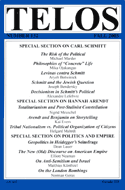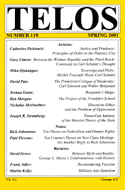By Philip Crone · Tuesday, February 16, 2010 Each Tuesday in the TELOSscope blog, we reach back into the archives and highlight an article whose critical insights continue to illuminate our thinking and challenge our assumptions. Today, Philip Crone looks at Aryeh Botwinick’s “Same/Other versus Friend/Enemy: Levinas contra Schmitt,” from Telos 132 (Fall 2005).
 Representative Joe Wilson’s outburst during President Obama’s speech to Congress on healthcare reform in some ways overshadowed the content of the speech itself. Had Wilson shouted out in another, non-American context, such as during the Prime Minister’s Question Time in the United Kingdom, he would have received little notice. But with an eye to the protocol and tradition surrounding presidential addresses to Congress in the United States, commentators from both the left and the right lambasted Wilson’s actions. Of course, Wilson was not without his supporters who seemed to have little concern for such protocols, or at least seemed to think that the gravity of the situation warranted violating the traditional standards. Still, Wilson’s yell stood in stark contrast to the lines offered at the end of Obama’s speech in which the President called for “[replacing] acrimony with civility.” Representative Joe Wilson’s outburst during President Obama’s speech to Congress on healthcare reform in some ways overshadowed the content of the speech itself. Had Wilson shouted out in another, non-American context, such as during the Prime Minister’s Question Time in the United Kingdom, he would have received little notice. But with an eye to the protocol and tradition surrounding presidential addresses to Congress in the United States, commentators from both the left and the right lambasted Wilson’s actions. Of course, Wilson was not without his supporters who seemed to have little concern for such protocols, or at least seemed to think that the gravity of the situation warranted violating the traditional standards. Still, Wilson’s yell stood in stark contrast to the lines offered at the end of Obama’s speech in which the President called for “[replacing] acrimony with civility.”
Continue reading →
By Philip Crone · Tuesday, November 10, 2009 Each Tuesday in the TELOSscope blog, we reach back into the archives and highlight an article whose critical insights continue to illuminate our thinking and challenge our assumptions. Today, Philip Crone looks two articles about the Frankfurt School: Ben Morgan’s “The Project of the Frankfurt School,” from Telos 119 (Spring 2001), and James Gordon Finlayson’s “Morality and Critical Theory: On the Normative Problem of Frankfurt School Social Criticisms,”from Telos 146 (Spring 2009).
In an earlier post on the TELOSscope blog, Nicole Burgoyne highlighted a 2001 interview with Paul Piccone in which he discussed the appearance of Telos in the 1960s. Piccone listed a number of ideological currents that played major formative roles in the early years of Telos, including Frankfurt School critical theory. Forty years after the first issue of Telos was published the journal is still going strong, but can the same be said of the critical theory of the Frankfurt School? The Frankfurt School itself long predates Telos; the beginnings of its program can be traced to the 1920s when the Institute for Social Research was founded by Carl Grünberg. The Frankfurt School, or at least what is known as its “first generation,” reached its apex with the publication of the second edition of Max Horkheimer and Theodor Adorno’s Dialectic of Enlightenment in 1947. While thinkers influenced by this first generation continue to exert enormous intellectual influence, the ideas of the original group itself have waned.
Continue reading →
By Philip Crone · Tuesday, October 13, 2009 Each Tuesday in the TELOSscope blog, we reach back into the archives and highlight an article whose critical insights continue to illuminate our thinking and challenge our assumptions. Today, Philip Crone looks at Fabio Vander’s “Kant and Schmitt on Preemptive War,” from Telos 125 (Fall 2002), and Michael Mack’s “Toward a Redefinition of Europe’s Political Identity: Spinoza’s Non-hierarchical Vision,” from Telos 145 (Winter 2008).
In the wake of the terrorist attacks of September 11, President Bush addressed a joint session of Congress, announcing the global war on terrorism and articulating the Bush doctrine of preemptive military action. His speech was followed shortly by the American-led invasion of Afghanistan, and a year later his administration began to make its case for war against Iraq. The formal campaign for the war began with President Bush’s address to the UN Security Council on September 12 and eventually led to the adoption of UN Security Council Resolution 1441, which called for “serious consequences” should Iraq not comply with weapons inspections.
Continue reading →
By Philip Crone · Tuesday, September 15, 2009 Each Tuesday in the TELOSscope blog, we reach back into the archives and highlight an article whose critical insights continue to illuminate our thinking and challenge our assumptions. Today, Philip Crone looks at Catherine Pickstock’s “Justice and Prudence: Principles of Order in the Platonic City,” from Telos 119 (Spring 2001), as well as a response to Pickstock’s article from Donald C. Hodges and Christopher A. Pynes.
 Recent discussions surrounding the death of Senator Ted Kennedy and talk about health care reform have reintroduced some of the most fundamental questions about justice and society into American political discourse. As ill-informed and histrionic as many of today’s arguments are, the matters being discussed are of great importance. And while at first it may not seem to have much relevance to the issues currently discussed, Plato’s Republic is in many ways the first comprehensive and influential work of Western political philosophy. The key questions of the Republic—the roles of social groups, the ideal qualifications for civic leaders, and the guiding principles for society—continue to have great contemporary relevance. Recent discussions surrounding the death of Senator Ted Kennedy and talk about health care reform have reintroduced some of the most fundamental questions about justice and society into American political discourse. As ill-informed and histrionic as many of today’s arguments are, the matters being discussed are of great importance. And while at first it may not seem to have much relevance to the issues currently discussed, Plato’s Republic is in many ways the first comprehensive and influential work of Western political philosophy. The key questions of the Republic—the roles of social groups, the ideal qualifications for civic leaders, and the guiding principles for society—continue to have great contemporary relevance.
Continue reading →
|
|
 Representative Joe Wilson’s outburst during President Obama’s speech to Congress on healthcare reform in some ways overshadowed the content of the speech itself. Had Wilson shouted out in another, non-American context, such as during the Prime Minister’s Question Time in the United Kingdom, he would have received little notice. But with an eye to the protocol and tradition surrounding presidential addresses to Congress in the United States, commentators from both the left and the right lambasted Wilson’s actions. Of course, Wilson was not without his supporters who seemed to have little concern for such protocols, or at least seemed to think that the gravity of the situation warranted violating the traditional standards. Still, Wilson’s yell stood in stark contrast to the lines offered at the end of Obama’s speech in which the President called for “[replacing] acrimony with civility.”
Representative Joe Wilson’s outburst during President Obama’s speech to Congress on healthcare reform in some ways overshadowed the content of the speech itself. Had Wilson shouted out in another, non-American context, such as during the Prime Minister’s Question Time in the United Kingdom, he would have received little notice. But with an eye to the protocol and tradition surrounding presidential addresses to Congress in the United States, commentators from both the left and the right lambasted Wilson’s actions. Of course, Wilson was not without his supporters who seemed to have little concern for such protocols, or at least seemed to think that the gravity of the situation warranted violating the traditional standards. Still, Wilson’s yell stood in stark contrast to the lines offered at the end of Obama’s speech in which the President called for “[replacing] acrimony with civility.”  Recent discussions surrounding the death of Senator Ted Kennedy and talk about health care reform have reintroduced some of the most fundamental questions about justice and society into American political discourse. As ill-informed and histrionic as many of today’s arguments are, the matters being discussed are of great importance. And while at first it may not seem to have much relevance to the issues currently discussed, Plato’s Republic is in many ways the first comprehensive and influential work of Western political philosophy. The key questions of the Republic—the roles of social groups, the ideal qualifications for civic leaders, and the guiding principles for society—continue to have great contemporary relevance.
Recent discussions surrounding the death of Senator Ted Kennedy and talk about health care reform have reintroduced some of the most fundamental questions about justice and society into American political discourse. As ill-informed and histrionic as many of today’s arguments are, the matters being discussed are of great importance. And while at first it may not seem to have much relevance to the issues currently discussed, Plato’s Republic is in many ways the first comprehensive and influential work of Western political philosophy. The key questions of the Republic—the roles of social groups, the ideal qualifications for civic leaders, and the guiding principles for society—continue to have great contemporary relevance. 






